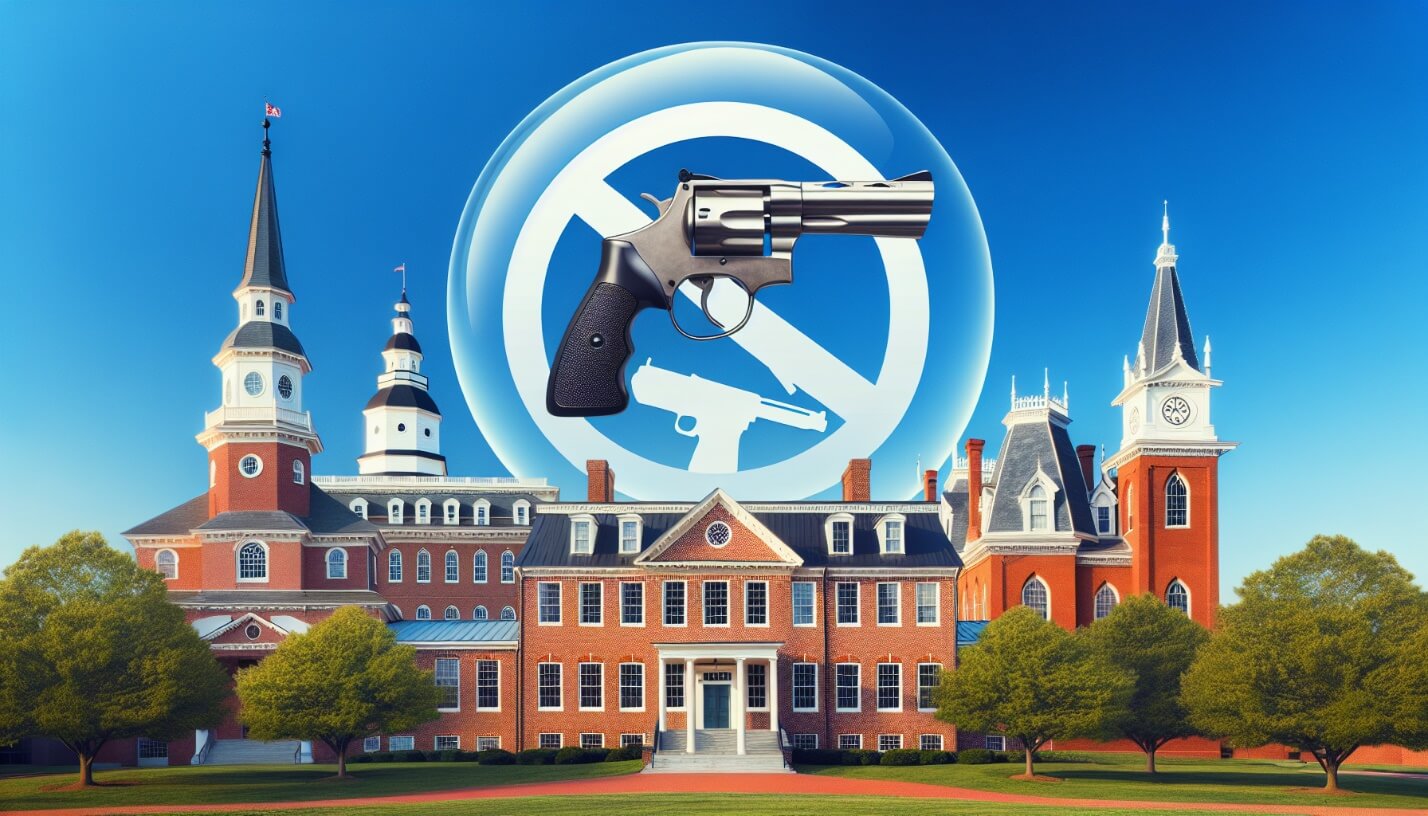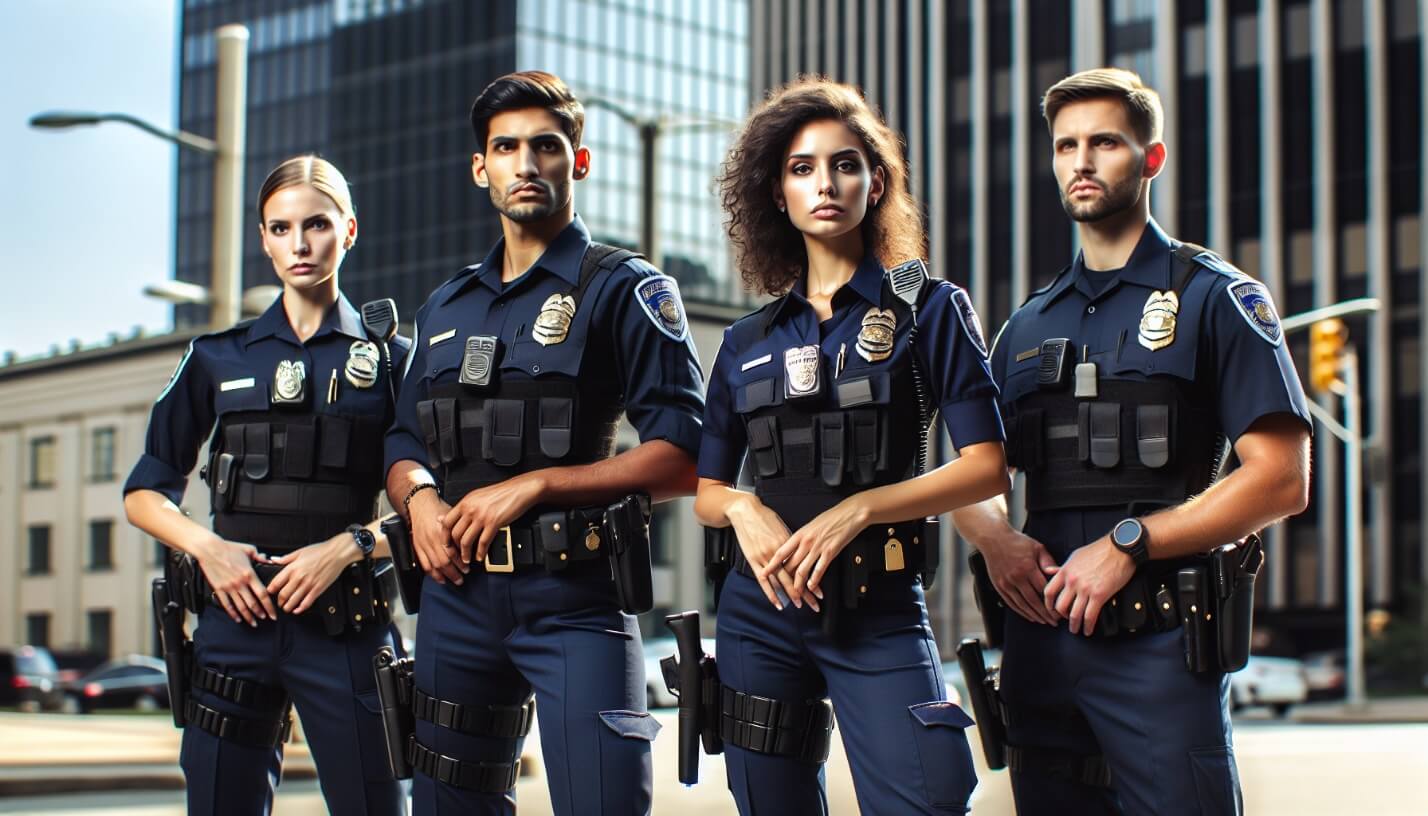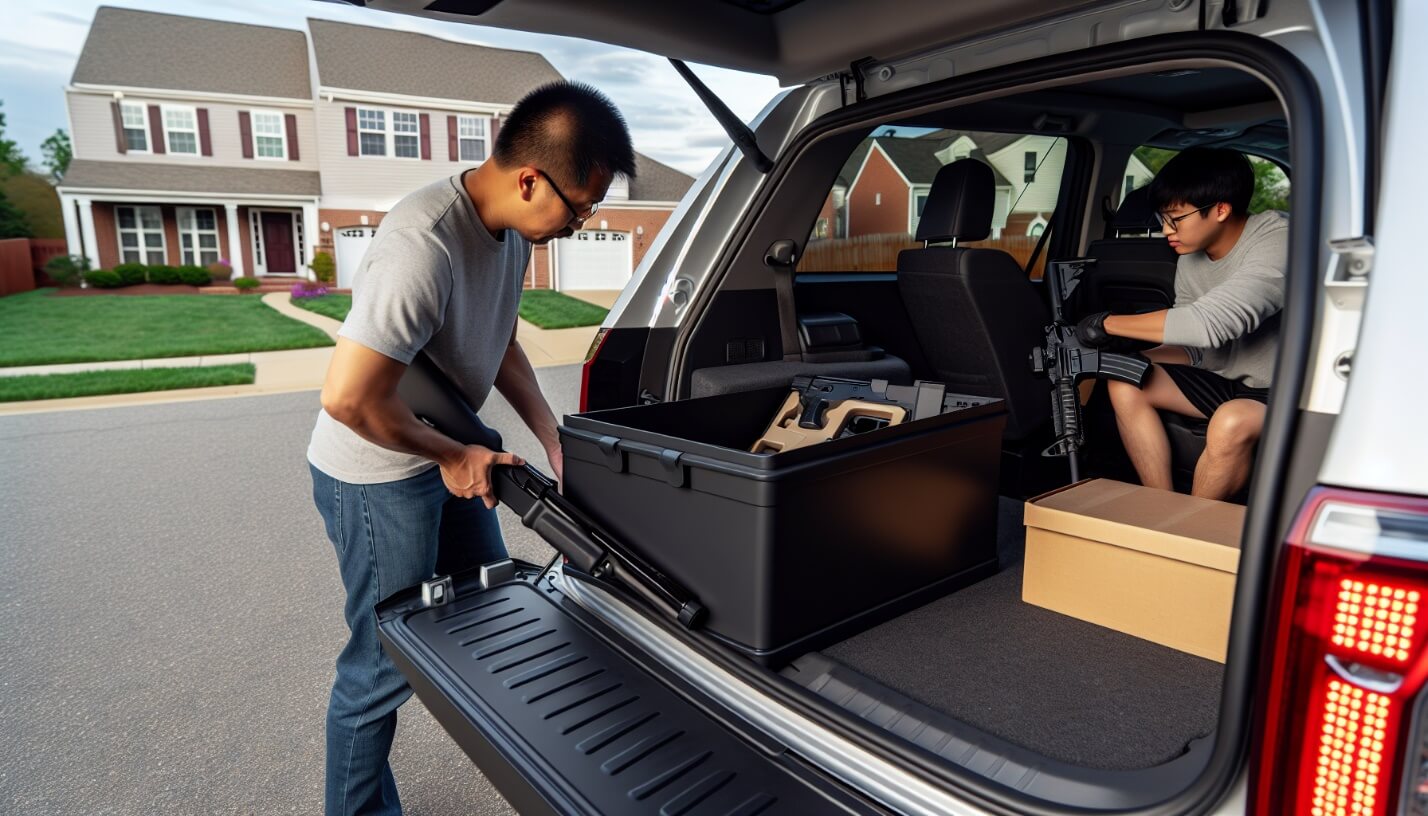Regulations and Permits Explained
Seeking a concealed carry permit in Maryland? This article details the key steps for concealed carry in Maryland: eligibility criteria, application process, necessary training, and the regulatory landscape. Get informed on how to legally carry a concealed weapon in the Old Line State without wading through unnecessary fluff.
Key Takeaways
- Maryland requires individuals to be at least 21 years old to apply for a concealed carry permit, necessitating a valid reason for carrying a handgun and completion of a state-approved firearms training course.
- Maryland does not recognize concealed carry permits from other states, meaning permit holders from other regions must adhere to Maryland’s specific regulations and cannot legally carry in the state.
- Those wishing to renew their Maryland concealed carry permit must do so 90 business days before expiry and complete an additional 8 hours of training; permits last for 2 years initially and 3 years upon subsequent renewals.
Navigating Maryland's Concealed Carry Permit Requirements

The path to legal concealed carry in Maryland starts with a clear comprehension of permit requirements. The state police hold the reins when it comes to issuing concealed carry permits. These permits, which are valid for two years, are the golden ticket to possessing firearms. Whether you’re a resident or non-resident, as long as you’re 21 or older, you’re eligible to apply for a permit. Non-residents too can follow the same application process as residents, reinforcing the inclusivity.
However, securing a permit involves more than just meeting the age and residency criteria. There are a series of prerequisite steps that applicants must undertake, which we will discuss in detail in the following subsections. We’ll examine the eligibility criteria, application steps, and renewal procedures for a well-rounded understanding of Maryland’s concealed carry permit requirements.
Eligibility Criteria for Handgun Permits
Who, then, qualifies to apply for a handgun permit in Maryland? Every adult who is 18 years of age or older and meets the state’s specific eligibility criteria can apply for a Maryland Wear and Carry Permit. And the process is the same for non-residents. But what are these eligibility criteria?
Applicants must meet the following requirements:
- Age requirement of at least 21 years old
- Provide a valid and substantial reason for carrying a handgun
- Successfully completed a state-approved 16-hour firearms training course
- Clean legal records, with no felony convictions or misdemeanors with a sentence of imprisonment for more than one year
- Exhibit stability and a lack of propensity for violence, ensuring that their possession of a handgun doesn’t pose a danger to themselves or others.
The Application Steps for a Maryland Carry Permit
Having scrutinized the eligibility criteria, it’s time to walk through the application process for a Maryland Carry Permit. Since October 2019, the state switched to an online application system, steering away from paperwork and towards digital efficiency. The starting point is to download the application form and submit it with the required specific items.
Next comes the fingerprinting process, which involves visiting an Authorized Electronic Fingerprint Processing Center. After submitting the application and undergoing fingerprinting, all you need to do is wait for the result. You should receive a response within 90 days, notifying you of the application’s approval or denial.
Renewing Your Maryland Handgun Permit
Obtaining your permit doesn’t mark the end of the process. As with many things in life, maintenance is key. And in Maryland, this means initiating the renewal process at least 90 business days before your permit expires. However, you don’t need to worry about forgetting this crucial deadline. The Maryland Licensing Portal will send you a timely renewal reminder.
Unlike the initial application, fingerprinting won’t be part of the renewal process. Initial Maryland handgun carry permits are typically valid for 2 years, with subsequent renewals lasting for 3 years. Upon renewal, your permit will expire on the last day of the holder’s birth month, either 2 years after the initial issuance or 3 years after each subsequent renewal. Keep in mind that you’ll need to complete an additional 8 hours of training to renew your Maryland Carry Permit.
Essential Training for Concealed Carry Applicants

Beyond permit requirements, the significance of apt training for concealed carry applicants is paramount. After all, owning a firearm is a responsibility that requires knowledge and skill. In Maryland, you need to successfully complete a state-approved firearms training course within 2 years prior to submitting an application for a new concealed carry permit or a renewal. This course comprises 16 hours of rigorous training for new applicants.
The training course covers an array of crucial topics, including state firearm law, home firearm safety, and details on handgun mechanisms and operation. If you’re renewing your permit, the course duration gets halved to 8 hours, but it must be instructed by a Qualified Handgun Instructor. To shed more light on this essential training, let’s break down its components and the proficiency requirements in the following subsections.
Components of the Firearms Training Course
A central part of getting a Maryland Wear and Carry Permit is completing a comprehensive firearms training course. Only Qualified Handgun Instructors (QHIs) certified by the Maryland Police and Correctional Training Commissions or a nationally recognized firearms organization can conduct these courses. To help applicants find QHIs, the Maryland State Police maintains an online list.
The training course encompasses various topics, including state firearm law, home firearm safety, and handgun mechanisms and operation. For renewal applicants, there’s an additional requirement. They need to show proficiency through a 25 round course of fire at various distances with a minimum accuracy of 70%. And to demonstrate their ability to safely fire a handgun, renewal applicants must bring their carry pistol, along with eye and hearing protection and 25 rounds of ammunition.
Demonstrating Proficiency: What You Need to Know
Demonstrating proficiency in firearm usage is a critical part of the Firearms Safety Training Course in Maryland. For most applicants, this involves completing a Basic Practical Handgun Course where they fire at least 25 rounds from no further than 15 yards, achieving a minimum of 70% accuracy. However, security personnel are required to complete a Practical Police Course, which involves firing at least 50 rounds from no further than 25 yards, also attaining at least 70% accuracy.
To prove their proficiency, applicants must complete a Certified Qualification Score Sheet, verifying a minimum score of 70% accuracy. The completed Score Sheet is then submitted with the Wear and Carry Permit Application.
This practical demonstration of proficiency, which has been successfully completed prior, is what sets apart trained permit holders from the rest, ensuring the safety of all involved.
Understanding Reciprocity Laws for Maryland
As we delve into the intricate maze of concealed carry laws, grasping reciprocity laws becomes paramount. Unfortunately, Maryland does not recognize concealed carry permits issued in other states. This means if you have a concealed carry permit from another state, it won’t hold any legal standing in Maryland.
While this may seem restrictive, it’s important to remember that each state has its unique set of laws and regulations. In the following subsections, we’ll scrutinize Maryland’s stance on out-of-state permits and provide guidance on how to navigate carry when traveling through the state.
Maryland's Stance on Out-of-State Permits
Maryland’s reciprocity laws are pretty straightforward: the state does not have reciprocity agreements with any other states. This means that individuals with concealed carry permits from other states cannot legally carry concealed weapons in Maryland. Even the Maryland State Police does not allow the carrying of handguns, either openly or concealed, within the state of Maryland with an out-of-state permit.
This lack of reciprocity can be challenging for out-of-state permit holders visiting or passing through Maryland. It emphasizes the importance of being informed about the varying state laws and adhering to them to avoid legal repercussions.
Navigating Carry When Traveling
Given Maryland’s stringent reciprocity laws, understanding how to handle carry when traversing the state is critical. Travelers with firearms on federally-regulated highways in Maryland must comply with both state laws and federal regulations. This calls for careful planning and stringent adherence to laws to avoid inadvertently breaking them.
While this may seem like a daunting task, being well-informed and prepared can make the journey smoother and safer. It’s a small price to pay for the peace of mind that comes with knowing you’re on the right side of the law.
Where You Can and Cannot Carry in Maryland

Awareness of where firearms can and cannot be carried in Maryland is equally vital as comprehending permit requirements and training obligations. The state prohibits carrying firearms in various locations, such as government buildings, schools, and certain private properties. And come October 1, 2023, more restrictions will take effect.
These rules may seem restrictive, but they’re in place to ensure public safety. In the following subsections, we’ll delve deeper into the newly prohibited areas as per the Senate Bill and the consequences of carrying in prohibited locations.
Newly Prohibited Areas as per Senate Bill
Effective October 1, 2023, Maryland will implement new restrictions on where firearms can be carried. These new no-carry zones will include:
- Locations licensed to sell or dispense alcohol or cannabis for on-site consumption
- Stadiums
- Museums
- Amusement parks
- Racetracks
- Video lottery facilities
These places will be required to post clear and conspicuous signs indicating that they are firearm-prohibited zones. This change in law is a significant development that gun owners and permit applicants must be aware of to ensure they remain compliant.
Consequences of Carrying in Prohibited Locations
Carrying firearms in prohibited areas in Maryland can lead to severe penalties. Here are some of the penalties for carrying firearms in certain areas:
- A first offense of carrying on school property carries a mandatory minimum penalty of 90 days.
- Repeat offenders face minimum one-year sentences or more.
- The maximum penalties can reach up to 20 years for severe violations.
- Penalties may also include disqualification from future firearm ownership or registration with a gun registry.
Furthermore, the recently enacted Senate Bill 1 imposes additional prohibitions and penalties. For instance, unlawful transportation of a firearm includes carrying on public transportation, and there are no exceptions for permit holders near public demonstrations. Penalties here include a minimum of 3 years imprisonment for a first offense, with increased penalties for subsequent offenses or stolen firearms.
Special Considerations for Certain Individuals

Although Maryland’s concealed carry laws apply uniformly, certain individuals have special considerations. For instance, law enforcement officers and retired officers enjoy certain privileges. On the other hand, medical cannabis users face unique challenges due to the conflict between state and federal laws.
Understanding these special considerations can help individuals navigate their unique circumstances more effectively. Let’s delve into the privileges accorded to law enforcement officers and the restrictions faced by medical cannabis users in the following subsections, while keeping in mind the role of a law enforcement agency in enforcing these regulations under legitimate medical direction.
Law Enforcement and Retired Officers' Privileges
Current law enforcement officers in Maryland have the unique privilege of being exempt from obtaining concealed weapons permits for the concealed carry of their service weapons while on duty. Retired officers also enjoy certain privileges. Those who served for at least 10 years are issued a credential card that allows them to carry a handgun without a separate concealed carry permit.
To receive this credential card, retired officers must meet annual firearms qualification standards and not be prohibited by law from receiving a firearm. Active law enforcement officers, including retirees in good standing, are also exempted from the firearms safety training course required for concealed carry permits in Maryland.
Medical Cannabis Users and Gun Ownership
Medical cannabis users face a unique predicament. While state laws permit the use of medical cannabis, federal laws prohibit these users from purchasing or possessing firearms. This conflict between state and federal law forms the crux of a bill proposed by Maryland lawmakers aimed at ensuring that medical cannabis patients are not denied the right to purchase, possess, or carry a firearm solely on the basis of their authorized use of medical cannabis.
This situation is a contentious issue, with advocates arguing that it’s not only about extending gun rights but also about constitutional rights and public safety. They believe that the law believes individuals possess property, such as firearms, and should be allowed to exercise their rights. Although a recent federal court ruling found the federal ban on firearm possession by cannabis consumers unconstitutional, this ruling is expected to be appealed.
Safe Transport and Storage of Firearms

Finally, but no less importantly, let’s tackle the subject of safe transport and storage of firearms. Maryland law stipulates that firearms must be transported in a locked container and separated from the driver’s compartment. The ammunition has to be kept separate from the firearm itself.
These rules are in place to ensure the safety of the gun owner and those around them. In the following subsections, we’ll provide more detailed guidelines for vehicle transport and tips for safe home storage practices.
Guidelines for Vehicle Transport
When transporting a firearm in a vehicle, there are specific guidelines you must follow in Maryland. For instance, the firearm must be transported directly to and from approved locations, such as homes, gun ranges, and hunting sites, without unnecessary stops.
The firearm should be stored in a locked container separate from the driver’s area and ammunition. Disassembly of the firearm is recommended when possible. It’s also worth noting that individuals with concealed carry permits, or when the firearm is locked in a container, may transport firearms in their vehicles through locations where possession is typically prohibited.
Home Storage and Safety Practices
When it comes to storing firearms at home, Maryland does not mandate a specific manner for storing unattended firearms. However, the state’s firearm storage laws apply to minors, who are defined as individuals under the age of 18 for these regulations.
Exceptions to these laws include situations where a minor has supervised access to firearms, such as being in the presence of someone 18 or older, in possession of law enforcement officers on duty, or holding a firearm and hunter safety certificate.
Despite the lack of specific storage requirements, it’s always wise to store firearms securely to prevent accidents and unauthorized access, considering that neither the firearm nor its storage location should be easily accessible to unauthorized individuals.
Summary
In conclusion, navigating the maze of concealed carry laws in Maryland can be daunting, but with comprehensive knowledge and adherence to regulations, it is certainly manageable. From understanding permit requirements and the mandatory training course to recognizing reciprocity laws and safe firearm transport and storage practices, this guide has covered the key aspects of Maryland’s concealed carry laws. Armed with this knowledge, you’re well-equipped to responsibly exercise your right to carry concealed firearms in Maryland.
Frequently Asked Questions
Can I conceal carry in Maryland?
No, Maryland state law prohibits the open carry of handguns for permit holders, so they must be carried concealed. This permit is issued by the Maryland State Police Licensing Division.
How hard is it to get CCW in Maryland?
It can be challenging to get a CCW in Maryland as it requires meeting specific age requirements, completing a firearms safety course, and passing a background check. The permit is valid for two years and may be renewed.
What is the new gun law in Maryland 2023?
The Maryland Gun Safety Act of 2023 prohibits gun owners from carrying firearms into schools, hospitals, government buildings, businesses selling alcohol or cannabis, stadiums, museums, racetracks, and video lottery facilities. This law aims to enhance safety in these public spaces.
Can pa residents conceal carry in Maryland?
No, residents of Pennsylvania can apply for a concealed carry license in Maryland, New Jersey, and New York, but not in Delaware.
What is the process for renewing a Maryland Handgun Permit?
To renew a Maryland Handgun Permit, it should be initiated at least 90 business days before it expires, and an additional 8 hours of training is required. You need to plan ahead and ensure you complete the necessary training in time.
We are offering a course on Maryland HGP . Check it out.
